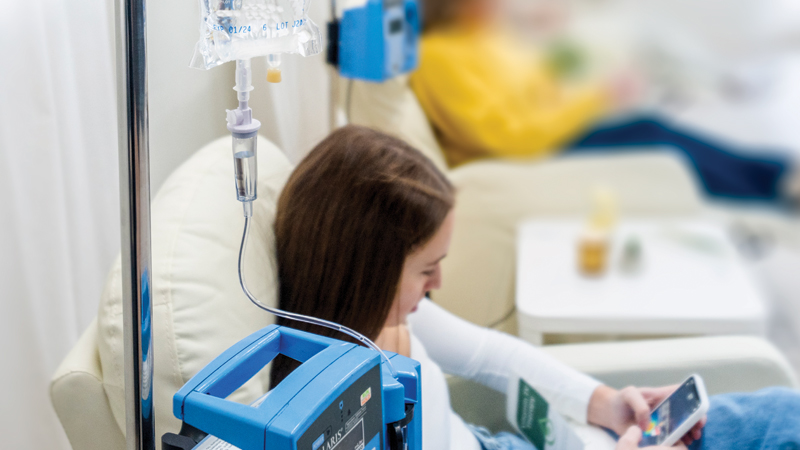Recognizing their position as one of the only providers of pediatric infusions in northern New Jersey, Valley Health System’s process improvement team understands the importance of comprehensive and streamlined care for pediatric patients and their families.
In 2022, the team discovered that their pediatric gastroenterology clinic’s baseline chair time for regular infusion treatments had risen to four hours. As a result, their patients — typically 9-year-olds to 15-year-olds with conditions like ulcerative colitis and Crohn’s disease — often missed school or extracurricular activities. This was frustrating for patients, families, and care teams.
Targeting baseline chair time as an area to improve, the team identified functionality in Expanse Oncology that could help and engaged stakeholders to make workflow improvements.
“We saw it as a quality improvement project and MEDITECH was an important part of the solution to the problem,” said Pediatric Gastroenterologist Antonio Quiros, MD, the chair of Children’s Services at Valley Health System. “Overall, Expanse has performed incredibly well and our patients have benefited greatly from this process change.”
Working closely with their physicians and nurses, the team reduced the total time of pediatric GI infusions from four hours in August 2022 to two and a half hours by July 2023.
Taking a new approach to pain points
Prior to Expanse, providers couldn’t enter infusion orders, premedications, dose rounding, and rate adjustments until the patient arrived at the clinic. Consequently, they were often interrupted at inopportune times to review patient information prior to signing orders. Since pharmacists could not begin verifying and compounding infusions until orders were signed, patients were required to wait for orders to be entered, received, reviewed, signed, and filled before their infusion even began.
Following its success using Expanse Oncology in other areas, Valley Health System implemented the same infusions infrastructure in its Pediatric Gastroenterology clinic, with the following objectives in mind:
- Decrease patient chair time
- Ensure minimal disruption of patient and caregiver schedules
- Prioritize patient experience
- Increase staff efficiency
Maximizing time savings
Since adopting Expanse Oncology’s infusion and scheduling functionality and making additional workflow improvements, the clinic has streamlined the ordering process for both providers and pharmacists. Providers are able to place orders in advance, at their convenience, allowing pharmacists to begin preparing the orders the moment a patient checks in.
"The time saver is that they know that those orders are waiting for the patient to arrive,” said Pharmacy Application Analyst John Heeren, RPh, MS. “They know this patient is scheduled and is coming in, so they make sure they have all the supplies ready to go."
Providers can also place orders once and repeat them as needed, enabling more flexibility to adjust treatment days to patient needs. Additionally, the rounding process on dosing preparations has been improved. Gastroenterologists and pharmacists can round off dosing based on built-in protocols when placing orders, reducing rework for their pharmacists.
With infusion orders placed and released in advance, the clinic staff and pharmacy team are better prepared for evening clinics, taking preventive measures to minimize delays and ensure staff and resources are available to accommodate increases in patient volume.
Expanse has helped the clinic’s previously reactive workflow become more proactive. During the day, pharmacists can procure enough anticipated product for the evening, and use dose rounding to minimize drug waste.
These improvements have been particularly helpful for moving patients to accelerated infusion protocols. Providers and staff can now monitor, document, and track in Expanse which patients tolerate infusions at a standard rate. Once all criteria have been met, clinicians can easily increase the rate for future infusions, further reducing appointment chair time.
Surpassing their goals
In less than a year, the process improvement team at Valley Health System was able to achieve its objectives of reducing chair time, improving the patient experience, and increasing staff efficiency. Chair time has been reduced nearly 40%, feedback from patients and families has been positive, and clinicians report lower levels of stress.
"My patients are thrilled with it,” observed Pediatric Gastroenterologist Lauren Jarchin-Dankner, MD. “We've improved the patient experience without compromising safety. Everyone's happy with the streamlined process."
Dr. Quiros agreed. “We have patient satisfaction, nurse satisfaction, and physician satisfaction. The level of stress has gone down dramatically.”

